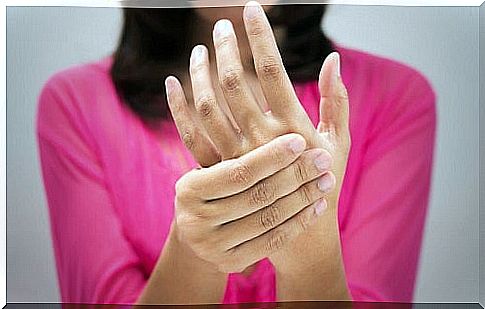8 Diseases That Cause Cold

The feeling of cold can be a sign of illness and the consequence of several factors, such as poor nutrition or a sedentary lifestyle. In the following, we will reveal 8 diseases that cause the sensation of cold, as well as the factors that can influence body temperature.
In general, if you can’t stand the cold, this can indicate a metabolic problem. Also, the continuous sensation of cold can be caused by a low percentage of body fat, which influences body temperature.
The sensation of cold can also be attributed to contracting an infection such as a cold or pneumonia, infections that cause a disorder in body temperature. At the same time, in the case of infections, the sensation of cold disappears once the cause is treated.
Cold sweats caused by low blood pressure and the feeling of cold in isolated parts of the body can be unpleasant and uncomfortable. Find out below some causes, factors and diseases that cause the sensation of cold.
Possible causes of the sensation of cold
- Hunger
- Anorexia
- Fatigue
- Infections
- Menopause
- In women, the amount of estrogen has a significant impact on body temperature, especially after menopause or pregnancy.
- Low body fat
- Problems with blood circulation
8 diseases that cause the sensation of cold
1. Anemia

Anemia is a disease characterized by a decrease in hemoglobin in the blood. This is a protein that is used to carry oxygen in the blood. Lack of red blood cells (also called erythrocytes) leads to anemia which, in turn, produces a feeling of cold, fatigue, pallor, irregular palpitations and difficulty breathing when exercising. Anemia is therefore one of the most severe diseases that causes the sensation of cold.
2. Iron deficiency
When a person suffers from iron deficiency, he is prone to chills and cold sweats. Iron is a mineral that plays an important role in transporting oxygen to blood cells. This is a process that plays a significant role in regulating whole body temperature.
People who have a permanent cold sensation are advised to have blood tests to check if the sensation is due to iron deficiency.
3. Traffic problems

Some of us, although we have a normal body temperature, can feel cold only in certain areas, especially in the extremities. It doesn’t matter the season, it can be summer or winter, you will feel your hands or feet cold. The extremities can sometimes take on a shade of blue and can be numb. This may indicate a blood circulation problem.
4. Raynaud’s syndrome
Raynaud’s syndrome is a condition of the bloodstream that can cause a permanent sensation of cold in the hands and feet. This syndrome is, in fact, one of the most serious diseases that causes the sensation of cold and affects only some areas of the body.
The cold may occur sporadically or due to exposure to it, and the symptoms may manifest for a few minutes or hours. When the person has an episode of chills, they will be advised to move and massage the affected areas to stimulate circulation and generate heat.
Patients with Raynaud’s syndrome will have white skin on their extremities due to lack of blood. In addition to feeling cold, the affected area may become numb or sensitive.
5. Thyroid problems

Feeling cold and tired, dry skin, thinning and brittle hair, and weight gain can be symptoms of hypothyroidism. This hormone has the role of regulating body temperature. For this reason, hypothyroidism is on the list of diseases that cause the sensation of cold. People who suffer from thyroid disease usually have a low body temperature. They also become more sensitive to low temperatures.
The thyroid also regulates the body’s metabolism and reactions. Metabolism slows down if the thyroid gland does not produce thyroid hormones effectively.
6. Diseases of the blood vessels
When blood flow to the hands and feet is impeded, it leads to a cold sensation. The obstacle can be related to a condition of the blood vessels, such as clotting problems or arteriosclerosis. Due to these conditions, the skin of the hands or feet becomes white or blue and tingling may occur in the affected area.
7. Diabetes

Diabetes is one of the most serious diseases that causes the sensation of cold. Diabetes is a symptom of kidney pain, also known as diabetic nephropathy, and its most common symptom is the feeling of cold. Diabetes also causes shortness of breath, inflammation of the legs, hands, face, and nausea and vomiting.
8. Anorexia
One of the main symptoms of anorexia is the feeling of cold. This is related to the low percentage of body fat, but also to any other element with a negative impact on the body.
Diet and body weight significantly influence sensitivity to heat and cold. In this sense, an unhealthy diet and poor in nutrients leads to chills, fatigue and cold sensation.
The body will function optimally only if the body temperature is about 37 ° C.
Other factors that cause the sensation of cold
1. Alcohol consumption

Many of us assume that our body temperature rises after drinking alcohol, no matter how much. But alcohol does not warm the body at all. On the contrary, alcohol transports heat to the surface of the body, ie it transfers heat from the inside to the outside. When the veins contract, the sensation of heat disappears and thus, the person will begin to tremble from the cold.
2. Fatigue
When the body begins to get tired (either due to lack of sleep or due to chronic fatigue), it will function slowly and inappropriately. The body produces less energy and thus reduces body temperature.
3. Diets that are too strict

People who follow too strict diets will not be able to provide the necessary calorie intake that can ensure efficient thermogenesis (ie the function of producing heat). The intake of calories in the recommended amounts will produce heat and thus will support the proper functioning of the body. The body does not have the ability to maintain its own temperature. For this reason, it is necessary to consume calories to ensure your thermogenesis.
4. Low percentage of body fat
People who have a low percentage of body fat will feel the cold faster and more often than others, because they do not have enough lipids in the body to provide them with a protective layer for the body.
5. Vitamin B12 deficiency

The body needs vitamin B12 to produce red blood cells, the cells that carry the oxygen the body needs. Vitamin B12 deficiency can cause a cold sensation, which can become chronic. This deficiency can be the result of a diet poor in this substance, but also of an intestinal malabsorption.
6. Some drugs that cause hypothermia
People do not pay attention to the fact that some drugs can cause various severe side effects, for example, urinary incontinence, hypothermia or even aggravation of hypothermia. These can be, for example, neuroleptics, barbiturates (sedatives), vasodilators, some antihypertensive drugs, antiepileptics, etc. To avoid unpleasant side effects, it is important to always read the package leaflet or ask a doctor.
Recommendations for improving the feeling of cold
- Exercise.
- Hydrate yourself.
- Avoid alcohol and smoking.
- Maintain a balanced diet.
- Eat chicken or vegetable soup.
- Eat more onions, garlic and ginger.
- Eat dried fruits rich in fatty acids such as omega 3.
If the feeling of cold is the result of low temperatures, follow these simple steps: wear thicker clothes or wear more layers of clothing and eat hot food and drinks. However, if it is not a low temperature, you may have some diseases that cause the sensation of cold. It is important to find the cause and appropriate treatment for this unpleasant symptom, as the causative health problems will require medical attention.









